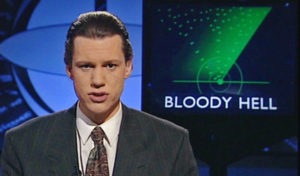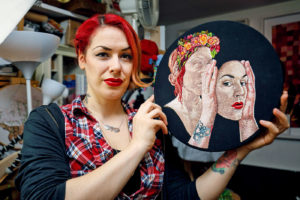On the day that Vladimir Putin initiated his invasion of Ukraine, the front page of the Daily Mail led with a story about a leaked document from MI5 and MI6, urging spies to acknowledge their “white privilege” and declare their pronouns. Almost simultaneously, a tweet from the Ministry of Defence, since deleted, announced that its LGBT coffee morning that day had been a great success, and that it had included discussions about pansexuality and asexuality.
But the military is far from alone in this new fixation with gender politics. If you haven’t yet been asked to declare your pronouns, it won’t be long. Sooner or later, your employer will suggest that you sign off emails with them, or announce them along with your name at the beginning of meetings.
Declaring our pronouns has become the most common way in which we are expected to pledge allegiance to the new identity-obsessed religion that has captured most of our major institutions. The likes of Nicola Sturgeon, Jeremy Corbyn, and Kamala Harris have all performed the ritual, but other figures have been less predictable. Who would have anticipated that Richard Moore, the Head of MI6, would suddenly decide to include “he/him” in his Twitter bio?
Such examples are a reminder of just how far the virus of Critical Social Justice has spread. Earlier this month, it was reported that members of staff at the British Library were being encouraged to wear pronoun badges with “he/him”, “she/her” or “they/them”. Last year, Scottish civil service staff were being asked to sign off emails with their preferred pronouns in order to “foster an open culture that is supportive of the LGBTI+ community”. Even the BBC has issued guidelines to encourage its staff to make similar gestures, claiming that adding pronouns to emails is a “small, proactive step that we can all take to help create a more inclusive workplace”.
Many of the more vociferous criticisms of pronoun declaration have come from the Right, which has inevitably created the impression that where you stand on this subject is a matter of political affiliation. As with so many debates in the culture wars, the issue of pronouns has been misrepresented as a simple question of whether one is on the right or wrong side of history.
Activists insist that it is just a way to be inclusive and polite — and in many cases that is clearly the intention. Yet the genuinely liberal position is to oppose pronoun declaration, and it is worth outlining this case in full given that most of us, at some point in the near future, will be faced with the choice between explaining our reasons for refusing or capitulating for the sake of an easy life.
When you ask someone to declare pronouns, you are doing one of two things. You are either saying that you are having trouble identifying this person’s sex, or you are saying that you believe in the notion of gender identity and expect others to do the same. As a species we are very well attuned to recognising the sex of other people, so, for the most part, to ask for pronouns is an expression of fealty to a fashionable ideology — and to set a test for others to do likewise.
In her book Trans: When Ideology Meets Reality, Helen Joyce explains the notion of gender identity as “something like a sexed soul”. Some take the view that each person has an innate gender identity that transcends physiological considerations. The definition of “woman” is therefore as fluid as can be imagined, because a “woman” is simply someone who identifies as a woman. The obvious next question — “what is a woman?” — is often dismissed as transphobic, presumably because the answer inexorably directs us towards the reality of sexual dimorphism.
Yet gender identity ideology is simply not a belief system that most people share. I do not identify as male; it’s a biological fact, as mundane as the fact that I’ve got blue eyes or that I’m right-handed. I am not here talking about gender dysphoria — those people who feel as odds with their sex and seek to adapt either through medical procedures or the way in which they present themselves — but rather the notion that we each have an inherent gender that has nothing to do with our bodies. This is akin to a religious conviction, and we would be rightly appalled if employers were to demand that their staff proclaim their faith in Christ the Saviour or Baal the Canaanite god of fertility before each meeting.
In an article in the Metro this week, a young person who identifies as non-binary complained about being misgendered by doctors when seeking treatment for endometriosis, a condition of the womb. But for a medical practitioner, biological sex is an important consideration that cannot simply be wished away. In the article, the writer notes that one young doctor — who had just completed a trans inclusivity training course — “seamlessly switched to using ‘they/them’ pronouns” in their conversation, although why he would make the curious decision to start addressing his patient in the third person is not clarified.
This point is often overlooked. Announcing one’s pronouns has little practical purpose in most scenarios, given that we do not refer to individuals by their pronouns unless we are talking about them, rather than to them. Moreover, even raising the question can be offensive. Julie Bindel has observed that women who reject traditional notions of femininity are frequently told that they “look like men”. To ask such an individual for her pronouns can be construed as a kind of attack, given that she will have struggled to achieve acceptance as a woman who simply does not conform to sex stereotypes.
Then there is the added complication of neopronouns. “They” and “them” are now routinely adopted as singular pronouns by the mainstream press, as though syntactically shambolic prose is a small price to pay for being seen to be “inclusive”. This usage has not caught on with the general public, but this hasn’t prevented staff at online dictionaries from updating their definitions in accordance with their new creed. No longer do they see their role as recording the inevitable evolutions of the English language, but rather re-engineering words and their meanings to suit their ideological preferences. On university campuses, it’s not uncommon for badges to be distributed during freshers’ week to limit the potential for faux pas. “My pronouns are he/him/his,” the badge might say, but it could just as easily be “they/them/their”, “xe/xem/xyr”, “ne/nym/nis”, “ve/ver/vis”, “fae/faer/faers” or “zie/zim/zir”. This kind of cryptic puzzle makes for quite the initiation.
Although no employers are as yet mandating pronoun declaration, there is something coercive about the request. An actor friend of mine recently told me that it is now common for members of a new cast to state their pronouns at the beginning of the rehearsal process. In such circumstances, he says, to refuse would be unfeasible. For one thing, objections to the practice are not very well understood, and you would be instigating a tense and lengthy debate just at the moment when the cast ought to be bonding. More seriously, a refusal would doubtless result in accusations of transphobia, and the actor in question would be unlikely to be cast in future productions. Who is going to scupper their own career over a couple of words?
It is often forgotten that many transgender people are opposed to pronoun declaration for a number of reasons. It draws needless attention to them when they just want to get on with their lives. It can have the effect of “outing” people against their will, particularly if they are in the early stages of their transition. It creates a false impression that gender identity ideology is the norm even though it is a belief system shared by relatively few. Most importantly, compelled speech is a fundamentally illiberal prospect, one that should always be resisted by all.
It is strange that the objections to pronoun declaration are so often construed as being “reactionary” when they are essentially progressive. Many who believe in liberal values will therefore feel uncomfortable in refusing to state pronouns at work. But until more people are prepared to make their feelings clear on this issue, it will continue to be misinterpreted as “a Right-wing talking-point”.
A refusal to participate in these rituals need not be antagonistic, and most employers will be happy to hear your reasons. There is always the possibility that you could be accused of transphobia or hate, but this is simply part of the coercive strategy. For all the awkward conversations that might arise, there is nothing Right-wing about standing up to ideologues who insist on imposing their values onto everyone else.
Disclaimer
Some of the posts we share are controversial and we do not necessarily agree with them in the whole extend. Sometimes we agree with the content or part of it but we do not agree with the narration or language. Nevertheless we find them somehow interesting, valuable and/or informative or we share them, because we strongly believe in freedom of speech, free press and journalism. We strongly encourage you to have a critical approach to all the content, do your own research and analysis to build your own opinion.
We would be glad to have your feedback.
Source: UnHerd Read the original article here: https://unherd.com




